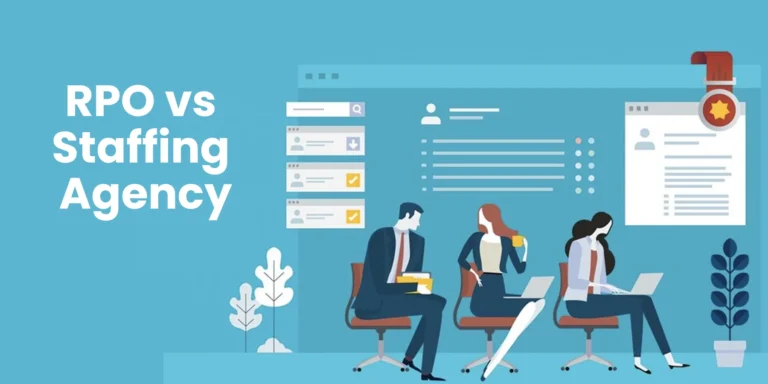
Contents
It is rather confusing to solve the way of recruitment and more difficult when one has to deal with so many terms in the maze of different abbreviations. Two common terms that you must be familiar with are RPO companies, abbreviated for Recruitment Process Outsourcing, and staffing agencies. Even though both of them play a significant role in terms of matching employers and talent, knowing the differences is so vital for companies and job seekers. In this blog post, we will discuss the significant divergences between the RPO companies in India and staffing firms; examine their unique role, and functions, and how they can best, provide a solution to your recruitment process.
What is an RPO company?
RPO (Recruitment Process Outsourcing) companies are strategic partners that are dedicated to handling either the whole or a part of an organization’s recruitment. They work with customers to break down hiring needs, and streamline their recruitment workflow, and they ultimately deliver highly qualified candidates. This is often done with the help of technology along with expertise in the industry at the end, which improves the overall talent acquisition strategy and enhances hiring outcomes.
What is a staffing agency?
Staffing agencies are firms that act as a channel between employers and job-seekers by matching candidates’ skills and levels of competence with the needs of the employee openings. Usually, these organizations concentrate on particular business branches or types of jobs and render temporary, permanent, or temporary-to-be-hired workers to companies searching for new employees.
Understanding the differences
Staffing agencies and Recruitment Process Outsourcing (RPO) companies are both unique in the recruitment industry but offer differing services to their clients. The knowledge of distinctions between these kinds of enterprises is vital in helping businesses make a decision that offers the most appropriate type of recruitment they need.
1. Scope of Services
- Staffing Agencies: Staffing agencies offer a wide range of staffing solutions, including temporary, permanent, and temp-to-hire solutions. They maintain a pool of candidates and match them with job vacancies based on their skills, expertise, and preferences. The agencies usually focus on employing certain industries or job types, acting as middlemen between workers and employers.
- RPO Companies: RPO companies provide recruitment services that cover the entire interviewing process starting from identifying and selecting the right candidates to their onboarding. Different from staffing agencies, RPO providers usually collaborate with their clients to assimilate the hiring needs of the clients and create appropriate strategies for recruitment that are focused on the special needs of the clients.
2. Level of Involvement
- Staffing Agencies: Today’s staffing agencies normally have a very transactive relationship with their clients; their primary goal is to fill the immediate hiring needs faster and cost-effectively. They might just deal with the details of the client’s recruitment strategy or workforce planning but not the big picture as the HR managers do.
- RPO Companies: RPO companies adopt more strategic recruitment principles and often serve as recruitment arms for clients’ HR departments. They work jointly with clients to develop a recruitment strategy tailored to their business goals, and their expertise and support are continuously provided during all stages of the recruitment process.
3. Cost Structure:
- Staffing Agencies: Staffing agencies typically receive the fee for a placement or take a percentage off hired candidate’s salary as a subscription to their services. The expenditure in this sense happens when the candidate is identified and placed onto the position.
- RPO Companies: RPO organisations may request compensation from customers in their terms of engagement, and due to this, the RPO fee will depend on the nature of the services provided. This fee structure may vary depending on a number of factors, including the amount of hiring, level of customisation, and extent of the engagement.
4. Focus on Efficiency and Quality
- Staffing Agencies: Temporary health care companies aim at placing employees fast and correctly, with the major goal of filling such staffing gaps in the short term. Despite this, they make sure to align the skills and qualifications of candidates to meet a client’s job vacancies and not just the company’s urgent hiring needs.
- RPO Companies: RPO companies pay particular attention to the delivery of the output and quality from the start to finish of the recruitment process. Their mission is to bring on board and keep the best people by granting satisfaction in the selection process and cultural compliance. RPO vendors are intensely focused on the need to be different for their customers as they strive to create top-tier groups that play an essential role in business growth.
In the end, both RPO companies and staffing agencies are equally important in the recruitment arena, but the ways they operate, the range of what they do, and the level of engagement they involve differ much. RPO agencies provide end-to-end recruitment solutions, customized to the unique needs of each client, encompassing the sourcing and onboarding stages. Conversely, agencies concentrate on completing immediate demands by offering temporary or permanent staff immediately. Recognizing the distinctions amidst different external support services for their recruitment can help organizational leaders in making the best decision. Organizations can choose between the partnership with top RPO companies for strategic purposes, and the fast resources of a staffing agency to streamline their hiring processes and attract a talented labor force that moves the business forward.